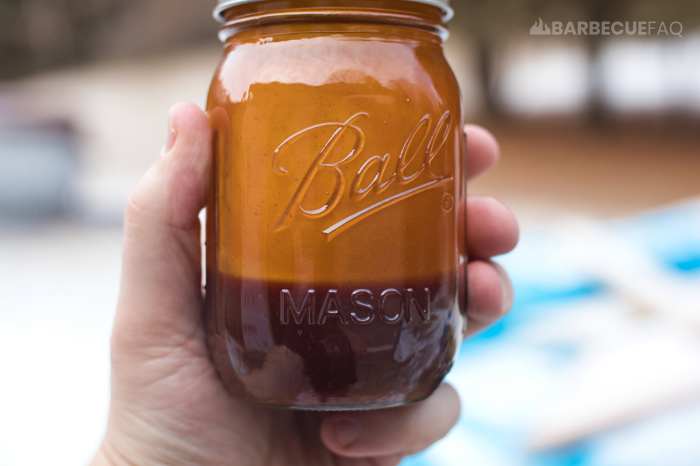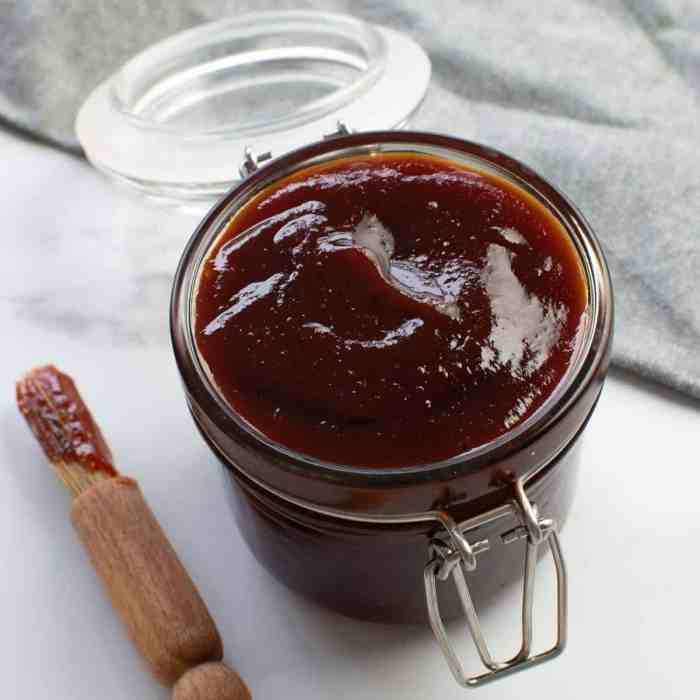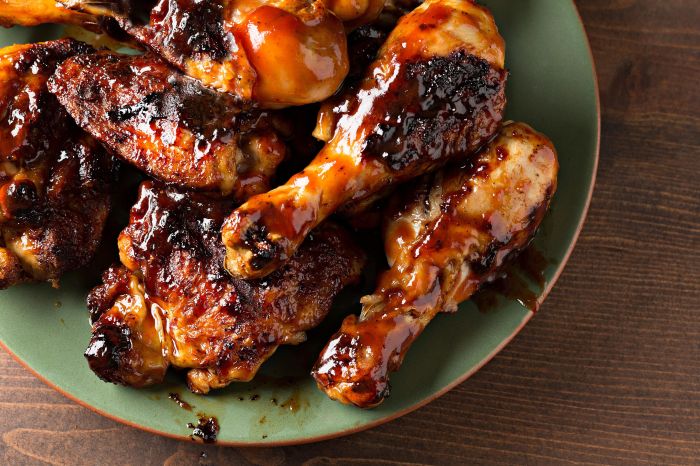BBQ Sauce Recipe with Beer A Flavorful Guide
Beer-Infused BBQ Sauce: A Flavorful Exploration

Source: barbecuefaq.com
Bbq sauce recipe with beer – The marriage of beer and barbecue sauce is a testament to culinary creativity, blending the robust character of fermented beverages with the smoky sweetness of classic BBQ. This exploration delves into the history, techniques, and diverse flavor profiles achievable through beer-infused BBQ sauces.
Introduction to Beer-Infused BBQ Sauce

Source: hintofhealthy.com
The use of beer in BBQ sauces has a rich, albeit somewhat undocumented, history. While pinpointing a precise origin is difficult, the practice likely emerged organically as brewers and pitmasters experimented with readily available ingredients. The cultural significance stems from the shared appreciation of community gatherings centered around both brewing and barbecuing – activities that often intertwine, especially in regions with strong brewing traditions.
The addition of beer enhances the overall experience, adding complexity and depth to a beloved culinary tradition.
Various beer styles lend themselves well to BBQ sauces. Stouts, with their roasted malt notes and often creamy texture, impart a rich, dark character. IPAs, known for their hop bitterness and citrusy aromas, contribute a vibrant, slightly bitter counterpoint to the sweetness of the sauce. Lagers, with their crisp, clean profiles, offer a subtle yet refreshing base. The choice of beer significantly impacts the final flavor profile of the sauce.
Using beer in BBQ sauce offers several key advantages. The enzymes in beer contribute to meat tenderness, breaking down tough fibers. The beer’s malt sugars add depth and complexity to the flavor, creating a more nuanced and interesting sauce than one made without it. The alcohol in beer evaporates during cooking, leaving behind only its characteristic flavor compounds.
Recipe Variations: Beer BBQ Sauce
Three distinct recipes highlight the versatility of beer in BBQ sauces, showcasing the unique flavor profiles achieved with different beer types. A vegan option is also included, demonstrating the adaptability of this culinary fusion.
Stout BBQ Sauce
| Ingredient | Quantity | Unit | Notes |
|---|---|---|---|
| Stout Beer | 1 cup | Use a robust, full-bodied stout. | |
| Brown Sugar | 1/2 cup | Adds sweetness and balances the stout’s bitterness. | |
| Ketchup | 1/2 cup | Provides body and tang. | |
| Apple Cider Vinegar | 1/4 cup | Adds acidity and brightness. | |
| Worcestershire Sauce | 2 tablespoons | Adds umami and complexity. | |
| Garlic Powder | 1 teaspoon | Enhances savory notes. | |
| Onion Powder | 1 teaspoon | Adds depth of flavor. | |
| Smoked Paprika | 1 teaspoon | Adds smokiness. | |
| Black Pepper | 1/2 teaspoon |
IPA BBQ Sauce
| Ingredient | Quantity | Unit | Notes |
|---|---|---|---|
| IPA Beer | 1 cup | Choose a hoppy IPA for a more pronounced bitterness. | |
| Honey | 1/2 cup | Balances the bitterness of the IPA. | |
| Mustard | 1/4 cup | Adds tang and complexity. | |
| Soy Sauce | 2 tablespoons | Adds saltiness and umami. | |
| Ginger | 1 tablespoon | grated | Adds warmth and spice. |
| Garlic | 2 cloves | minced | Enhances savory notes. |
| Cayenne Pepper | 1/2 teaspoon | Adds a touch of heat. |
Lager BBQ Sauce
| Ingredient | Quantity | Unit | Notes |
|---|---|---|---|
| Lager Beer | 1 cup | A crisp, light lager works best. | |
| Maple Syrup | 1/2 cup | Provides sweetness and depth. | |
| Tomato Paste | 1/4 cup | Adds body and richness. | |
| Lemon Juice | 2 tablespoons | Adds brightness and acidity. | |
| Onion, chopped | 1/2 cup | Adds sweetness and texture. | |
| Celery Seed | 1 teaspoon | Adds subtle earthiness. | |
| Black Pepper | 1/2 teaspoon |
Vegan Beer BBQ Sauce
To create a vegan version, replace honey with agave nectar or maple syrup, and Worcestershire sauce with a vegan alternative (many are available commercially). Ensure your ketchup and mustard are also vegan-friendly.
Flavor Pairing and Enhancement, Bbq sauce recipe with beer

Source: thespruceeats.com
The ideal meat pairing depends on the beer used in the sauce. Stout BBQ sauce complements rich, slow-cooked meats like brisket or short ribs. The IPA BBQ sauce’s bright, hoppy notes pair well with chicken or pork. Lager BBQ sauce’s versatility allows it to be used with a wider variety of meats, including grilled chicken, burgers, and even fish.
To further enhance the beer flavor, consider adding complementary spices. For stout-based sauces, smoked paprika or chipotle powder intensifies the smoky notes. In IPA-based sauces, a touch of ginger or garlic complements the citrusy hops. Lager sauces can be enhanced with celery seed or a hint of caraway.
The flavor profiles differ significantly. Stout sauces are rich, dark, and slightly bitter; IPA sauces are bright, hoppy, and slightly sweet; Lager sauces are light, crisp, and subtly sweet. The choice of beer dramatically alters the overall taste and texture of the final product.
Cooking Methods and Techniques
Several methods allow for the creation of delicious beer BBQ sauce. Each method offers a unique texture and flavor profile.
Stovetop Method: Combine all ingredients in a saucepan over medium heat. Bring to a simmer, then reduce heat and cook, stirring frequently, until the sauce thickens to your desired consistency (approximately 30-45 minutes). Adjust the heat to prevent burning.
Slow Cooker Method: Combine all ingredients in a slow cooker and cook on low for 6-8 hours, or until thickened. The slow cooker method results in a smoother, more tender sauce. Stir occasionally to prevent sticking.
Smoking Method: After preparing the sauce using the stovetop or slow cooker method, transfer it to a smoker and cook for 1-2 hours at a low temperature (around 225°F). This imparts a smoky flavor, enhancing the overall profile.
Storage and Shelf Life
Proper storage is crucial for maintaining the quality and safety of homemade BBQ sauce. Refrigerate leftover sauce in airtight containers for up to 5 days. For longer storage, freeze the sauce in freezer-safe containers for up to 3 months. Thaw frozen sauce in the refrigerator before use.
Several factors influence shelf life. The presence of high-acid ingredients like vinegar extends shelf life. Improper storage, such as leaving the sauce at room temperature, significantly reduces its lifespan. Signs of spoilage include mold growth, off-odors, and changes in texture or color.
Visual Representation of the Recipes
Stout BBQ Sauce: Imagine a deep, mahogany-colored sauce, thick and glossy, with flecks of dark brown sugar visible throughout. The aroma is rich and inviting, with notes of roasted malt and a hint of smokiness.
IPA BBQ Sauce: Picture a vibrant amber-hued sauce, slightly thinner than the stout version, with a glistening surface. The aroma is zesty and slightly bitter, with hints of citrus and floral hops.
Lager BBQ Sauce: Envision a light, translucent amber sauce, with a smooth, almost syrupy consistency. The aroma is subtly sweet, with a clean, refreshing lager scent.
Stovetop Method Visual Description: The process begins with a lively mix of ingredients in a saucepan. As it simmers, the sauce gradually thickens, changing from a watery consistency to a rich, viscous texture. The final product is a smooth, glossy sauce, ready to be bottled.
FAQ Explained: Bbq Sauce Recipe With Beer
Can I use any type of beer in BBQ sauce?
While many beers work, avoid overly sour or heavily spiced beers. Lagers, stouts, IPAs, and even some ales are good choices.
How long will homemade beer BBQ sauce last?
Properly refrigerated, homemade beer BBQ sauce will typically last for 1-2 weeks. Freezing extends its shelf life to several months.
A fantastic BBQ sauce recipe often incorporates beer for a rich, malty depth. Exploring diverse flavor profiles can significantly enhance your sauce, and for inspiration, you might check out the unique ingredients used in zhong sauce recipes , which often feature unexpected combinations. This exploration can then inform your own experimentation with your beer-based BBQ sauce, leading to a truly distinctive and delicious result.
What are the signs of spoiled BBQ sauce?
Signs of spoilage include mold growth, off-odors (sour, vinegary), and a change in texture (thinning or thickening significantly).
Can I make this sauce without a slow cooker?
Absolutely! The recipes are adaptable for stovetop preparation. Adjust cooking times accordingly.




















